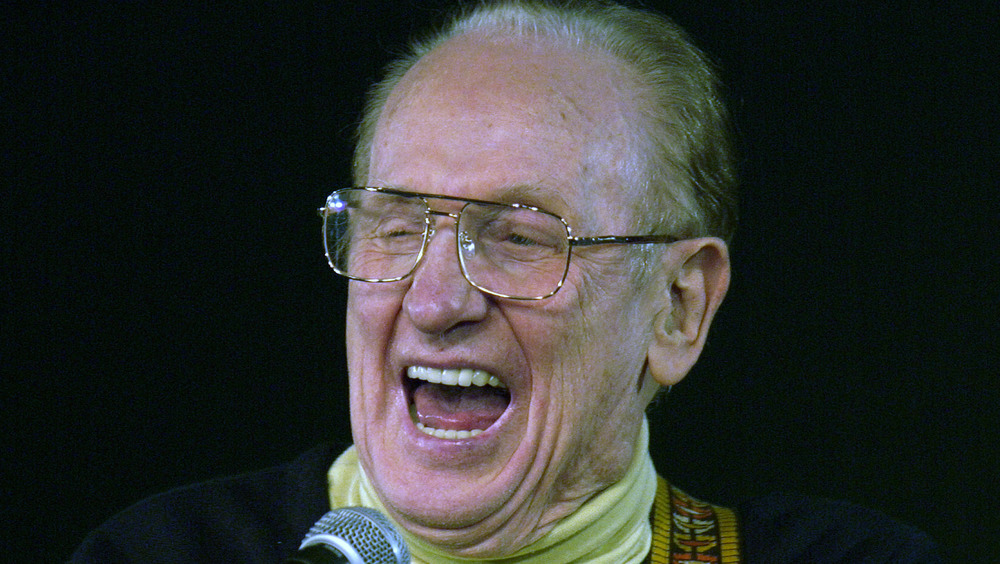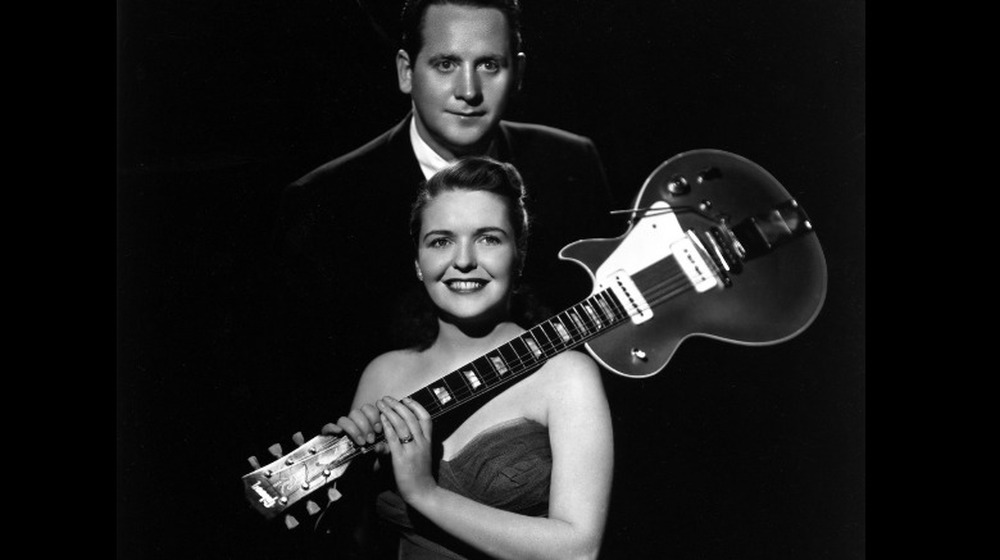The Truth About Les Paul, Rock 'N' Roll Virtuoso
When guitar legend Les Paul died on August 13, 2009, he left behind an amazing legacy of music and guitars. But his success in music and as a musician was almost ended prematurely. The New York Times writes in his obituary that his piano teacher told his mother, "Your boy, Lester, will never learn music." Fair to say that Les Paul proved that teacher wrong.
He built an electric guitar in 1941, but before he could get it manufactured, Leo Fender had developed and produced his Fender Broadcaster guitar in 1948 (via Biography). Therefore, Fender gets the credit for the first solid-body electric guitar, even though, technically, Paul's model was invented earlier.
More than just a musician, Paul was also an inventor and innovator. While he's known first and foremost for his electric guitars, he actually is credited with developing a number of sound recording innovations, some of which from his experimentation with different settings on his mother's Victrola, notes The New York Times. He also is credited with inventing the first eight-track recording system.
But Paul wasn't a natural inventor. In a 1991 interview with The Times he said, "Honestly, I never strove to be an Edison. The only reason I invented these things was because I didn't have them and neither did anyone else. I had no choice, really."
The wife and medical times of Les Paul.
When he started playing with his future wife in 1947 he made her change her name from Colleen Summers to Mary Ford — a name he found in the phone book. In their home they hung microphones everywhere so they could record in different rooms. According to The New York Times they even hung a microphone over the sink so that Mary could record while washing dishes.
Medical issues chased Paul as well. In 1948 he shattered his right elbow in a car accident. There was concern he wouldn't ever play guitar again, and there were discussions as to whether to amputate his arm (via Poindexter's). The injury was so bad it had to be permanently set, so Paul chose to have it at about a 90 degree angle so he could still play guitar, reports Biography.
Paul suffered partial permanent hearing loss in 1969 when a friend jokingly smacked his ear, causing the eardrum to rupture (via The Hearing Health Foundation). In his autobiography, Les Paul in His Own Words, he reveals the ear became infected, and surgery to repair it made that hearing loss permanent. In a terrible twist, later a different friend did the same thing to his other ear, with similar results. Paul would wear hearing aids for the rest of his life.
Years later, his advanced arthritis eventually caused significantly decreased mobility in fingers on both hands, forcing him to relearn how to play guitar in a method that let him compensate (via The New York Times).
The legacy of Les Paul lives on
On February 15, 1996, Les Paul was inducted into the New Jersey Inventors' Hall of Fame.
Currently, of the Gibson Les Paul guitar models available for sale, the cheapest retails for $3,799. Les Paul's second prototype (as the Times reports), his own personal custom Gibson, nicknamed Black Beauty, went to auction in 2015 and sold for $335,500, reports Guitar World. While it was a significant amount, it was still far less than the Guinness World Record of the more than $6 million paid for Kurt Cobain's "MTV Unplugged" guitar in 2020.
In 1995 Paul began seriously thinking about his legacy, and according to North Jersey.com, he then began the process of creating The Les Paul Foundation. A registered 501(c)3 non-profit, their three main arms are supporting innovative projects in music production, performance, and STEM/STEAM-related programs; fund medical research towards hearing issues like tinnitus and hearing loss; and continue to communicate to the world the history of Les Paul and his achievements. Over the years the foundation has awarded over $4 million in grants, including support for a permanent exhibit on Les Paul at the Waukesha County Museum, Wisconsin, which was expanded in 2020.
And in the ultimate tribute to how revered Paul's guitars are, Bob Marley was buried with his own red Gibson Les Paul (via The Guardian).


